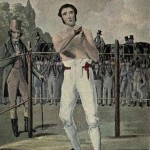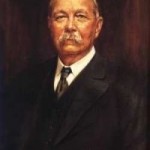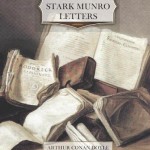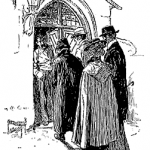But no answer came. The man was insensible. And then the danger of his position came upon Montgomery, and he turned as white as his antagonist. A Sunday, the immaculate Dr. Oldacre with his pious connection, a savage brawl with a patient; he would irretrievably lose his situation if the facts came out. It was not much of a situation, but he could not get another without a reference, and Oldacre might refuse him one. Without money for his classes, and without a situation—what was to become of him? It was absolute ruin.
But perhaps he could escape exposure after all. He seized his insensible adversary, dragged him out into the centre of the room, loosened his collar, and squeezed the surgery sponge over his face. He sat up at last with a gasp and a scowl.
“Domn thee, thou’s spoilt my necktie,” said he, mopping up the water from his breast.
“I’m sorry I hit you so hard,” said Montgomery, apologetically.
“Thou hit me hard! I could stan’ such fly-flappin’ all day. ‘Twas this here press that cracked my pate for me, and thou art a looky man to be able to boast as thou hast outed me. And now I’d be obliged to thee if thou wilt give me t’ wife’s medicine.”
Montgomery gladly made it up and handed it to the miner.
“You are weak still,” said he. “Won’t you stay awhile and rest?”
“T’ wife wants her medicine,” said the man, and lurched out at the door.
The assistant, looking after him, saw him rolling with an uncertain step down the street, until a friend met him, and they walked on arm-in-arm. The man seemed in his rough Northern fashion to bear no grudge, and so Montgomery’s fears left him. There was no reason why the doctor should know anything about it. He wiped the blood from the floor, put the surgery in order, and went on with his interrupted task, hoping that he had come scathless out of a very dangerous business.
Yet all day he was aware of a sense of vague uneasiness, which sharpened into dismay when, late in the afternoon, he was informed that three gentlemen had called and were waiting for him in the surgery. A coroner’s inquest, a descent of detectives, an invasion of angry relatives—all sorts of possibilities rose to scare him. With tense nerves and a rigid face he went to meet his visitors.
They were a very singular trio. Each was known to him by sight; but what on earth the three could be doing together, and, above all, what they could expect from him, was a most inexplicable problem.
The first was Sorley Wilson, the son of the owner of the Nonpareil Coalpit. He was a young blood of twenty, heir to a fortune, a keen sportsman, and down for the Easter Vacation from Magdalene College. He sat now upon the edge of the surgery table, looking in thoughtful silence at Montgomery, and twisting the ends of his small, black, waxed moustache.
The second was Purvis, the publican, owner of the chief beershop, and well known as the local bookmaker. He was a coarse, clean-shaven man, whose fiery face made a singular contrast with his ivory-white bald head. He had shrewd, light-blue eyes with foxy lashes, and he also leaned forward in silence from his chair, a fat, red hand upon either knee, and stared critically at the young assistant.
So did the third visitor, Fawcett, the horsebreaker, who leaned back, his long, thin legs, with their box-cloth riding-gaiters, thrust out in front of him, tapping his protruding teeth with his riding-whip, with anxious thought in every line of his rugged, bony face. Publican, exquisite, and horsebreaker were all three equally silent, equally earnest, and equally critical. Montgomery, seated in the midst of them, looked from one to the other.
“Well, gentlemen?” he observed, but no answer came.
The position was embarrassing.
“No,” said the horsebreaker, at last. “No. It’s off. It’s nowt.”
“Stand oop, lad; let’s see thee standin’.” It was the publican who spoke.
Montgomery obeyed. He would learn all about it, no doubt, if he were patient. He stood up and turned slowly round, as if in front of his tailor.
“It’s off! It’s off!” cried the horsebreaker. “Why, mon, the Master would break him over his knee.”
“Oh, that behanged for a yarn!” said the young Cantab. “You can drop out if you like, Fawcett, but I’ll see this thing through, if I have to do it alone. I don’t hedge a penny. I like the cut of him a great deal better than I liked Ted Barton.”
“Look at Barton’s shoulders, Mr. Wilson.”
“Lumpiness isn’t always strength. Give me nerve and fire and breed. That’s what wins.”
“Ay, sir, you have it theer—you have it theer!” said the fat, red-faced publican, in a thick, suety voice. “It’s the same wi’ poops. Get ’em clean-bred an’ fine, and they’ll yark the thick ‘uns—yark ’em out o’ their skins.”
“He’s ten good pund on the light side,” growled the horsebreaker.
“He’s a welter weight, anyhow.”
“A hundred and thirty.”
“A hundred and fifty, if he’s an ounce.”
“Well, the master doesn’t scale much more than that.”
“A hundred and seventy-five.”




